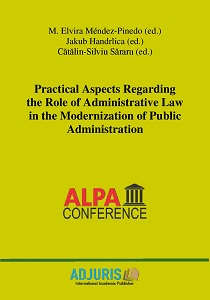The proportionality principle used as standard by the European Court of Human Rights when assessing the excess of power
The proportionality principle used as standard by the European Court of Human Rights when assessing the excess of power
Author(s): Oana Şaramet, Georgeta-Bianca Spîrchez
Subject(s): Human Rights and Humanitarian Law, Public Law
Published by: Societatea de Stiinte Juridice si Administrative
Keywords: principle of proportionality; public interest; freedom of expression; the right to peaceful assembly and association; limitation of the property right;
Summary/Abstract: The study herein aims at examining the implementation of the proportionality principle in the European Court of Human Rights case law, as a means of controlling the activity of the national authorities, namely limiting the excess of discretionary power. The main motivation for such an approach consists in providing the guidelines in the decisionmaking process of restricting certain fundamental rights and freedoms, so that the provided substantiation to form the belief that all relevant factors have been taken into accountand that the measures implemented in those cases are transparent, non-discriminatory and accountable. Thus, in drawing up this study, we have taken into account the relevance that the principle of proportionality should have in the activity of the public authorities, including that of the public administration. The exercise of their powers shall be always done in accordance with the principle of legality, but also within the limits of the discretionary power accepted so as not to prejudice the fundamental rights and freedoms of individuals and not to compromise the public interest by excess power or even abuse of power. The importance of the principle of proportionality is also revealed by the Constitutional Court of Romania, which has built its own case-law in this respect on the jurisprudential elements developed by the ECHR. This is the reason for which, in this study, we shall also mention the case-law issues of the Romanian Constitutional Court, not just those of ECHR.
- Page Range: 48-61
- Page Count: 14
- Publication Year: 2019
- Language: English
- Content File-PDF

